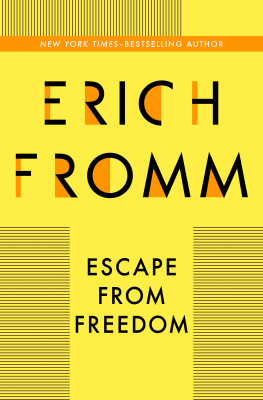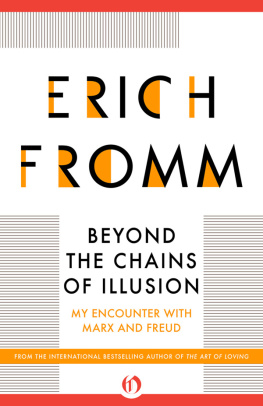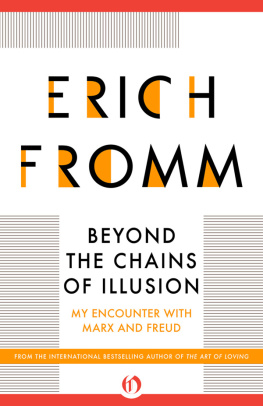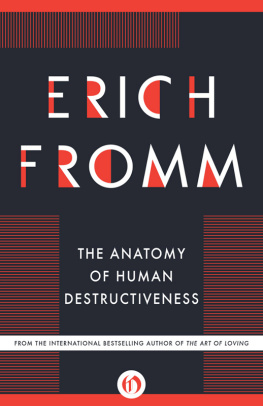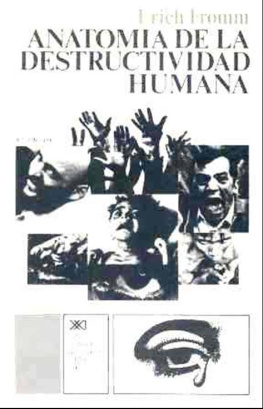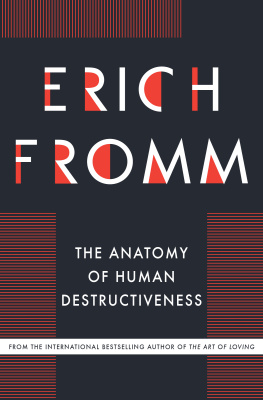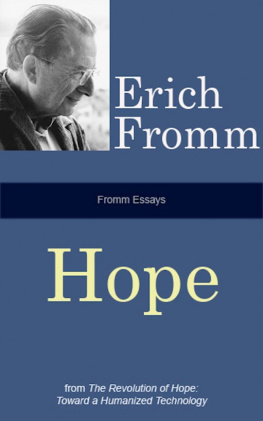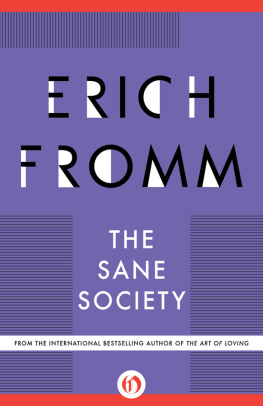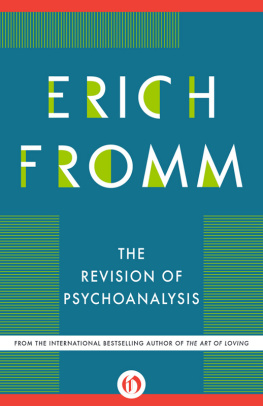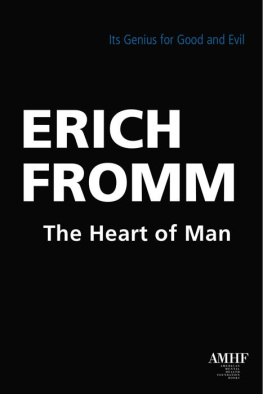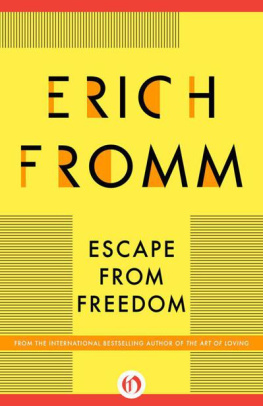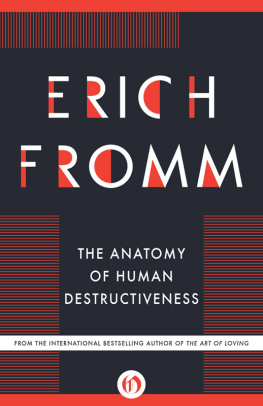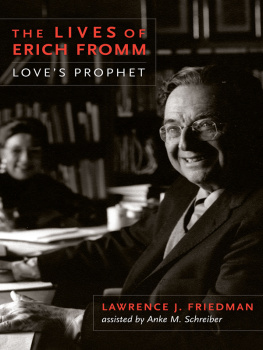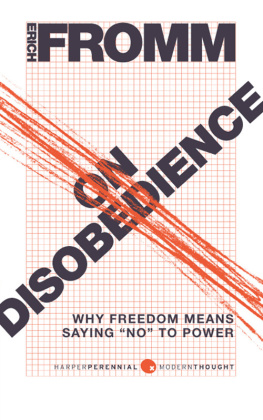
Escape from Freedom
Erich Fromm

If I am not for myself, who will be for me?
If I am for myself only, what am I?
If not nowwhen?
Talmudic Saying
Mishnah, Abot
Neither heavenly nor earthly, neither mortal nor immortal have we created thee, so that thou mightest be free according to thy own will and honor, to be thy own creator and builder. To thee alone we gave growth and development depending on thy own free will. Thou bearest in thee the germs of a universal life.
Pico della Mirandola
Oratio de Hominis Dignitate
Nothing then is unchangeable but the inherent and inalienable rights of man.
Thomas Jefferson
Foreword
This book is part of a broad study concerning the character structure of modern man and the problems of the interaction between psychological and sociological factors which I have been working on for several years and completion of which would have taken considerably longer. Present political developments and the dangers which they imply for the greatest achievements of modern cultureindividuality and uniqueness of personalitymade me decide to interrupt the work on the larger study and concentrate on one aspect of it which is crucial for the cultural and social crisis of our day: the meaning of freedom for modern man. My task in this book would be easier could I refer the reader to the completed study of the character structure of man in our culture, since the meaning of freedom can be fully understood only on the basis of an analysis of the whole character structure of modern man. As it is, I have had to refer frequently to certain concepts and conclusions without elaborating on them as fully as I would have done with more scope. In regard to other problems of great importance, I have often been able to mention them only in passing and sometimes not at all. But I feel that the psychologist should offer what he has to contribute to the understanding of the present crisis without delay, even though he must sacrifice the desideratum of completeness.
Pointing out the significance of psychological considerations in relation to the present scene does not imply, in my opinion, an overestimation of psychology. The basic entity of the social process is the individual, his desires and fears, his passions and reason, his propensities for good and for evil. To understand the dynamics of the social process we must understand the dynamics of the psychological processes operating within the individual, just as to understand the individual we must see him in the context of the culture which molds him. It is the thesis of this book that modern man, freed from the bonds of pre-individualistic society, which simultaneously gave him security and limited him, has not gained freedom in the positive sense of the realization of his individual self; that is, the expression of his intellectual, emotional and sensuous potentialities. Freedom, though it has brought him independence and rationality, has made him isolated and, thereby, anxious and powerless. This isolation is unbearable and the alternatives he is confronted with are either to escape from the burden of his freedom into new dependencies and submission, or to advance to the full realization of positive freedom which is based upon the uniqueness and individuality of man. Although this book is a diagnosis rather than a prognosisan analysis rather than a solutionits results have a bearing on our course of action. For, the understanding of the reasons for the totalitarian flight from freedom is a premise for any action which aims at the victory over the totalitarian forces.
I forego the pleasure it would be to thank all those friends, colleagues and students to whom I am indebted for their stimulation and constructive criticisms of my own thinking. The reader will see in the footnotes reference to the authors of whom I feel most indebted for the ideas expressed in this book. However, I wish to acknowledge specifically my gratitude to those who have contributed directly to the completion of this volume. In the first place, I wish to thank Miss Elizabeth Brown, who both by her suggestions and her criticisms has been of invaluable help in the organization of this volume. Furthermore, my thanks are due to Mr. T. Woodhouse for his great help in editing the manuscript and to Dr. A. Seidemann for his help in the philosophical problems touched upon in this book.
I wish to thank the following publishers for the privilege of using extensive passages from their publications: Board of Christian Education, Philadelphia, excerpts from Institutes of the Christian Religion, by John Calvin, translated by John Allen; the Columbia Studies in History, Economics, and Public Law (Columbia University Press), New York, excerpts from Social Reform and the Reformation, by Jacob S. Schapiro; Wm. B. Eerdmans Publishing Co., Grand Rapids, Mich., excerpts from The Bondage of the Will, by Martin Luther, translated by Henry Cole; Harcourt, Brace and Company, New York, excerpts from Religion and the Rise of Capitalism, by R. H. Tawney; Houghton Mifflin Company, Boston, excerpts from Mein Kampf, by Adolf Hitler; the Macmillan Company, New York, excerpts from The Civilization of the Renaissance in Italy, by Jacob Burckhardt.
E. F.
Foreword II
Almost twenty-five years have passed since the first edition of this book was published. The twenty-four editions which have been published since then have been read by professionals, laymen, and especially by students, and I am happy that this publication in the Avon Library will make it more easily available to many more readers.
Escape from Freedom is an analysis of the phenomenon of mans anxiety engendered by the breakdown of the Medieval World in which, in spite of many dangers, he felt himself secure and safe. After centuries of struggles, man succeeded in building an undreamed-of wealth of material goods; he built democratic societies in parts of the world, and recently was victorious in defending himself against new totalitarian schemes; yet, as the analysis in Escape from Freedom attempts to show, modern man still is anxious and tempted to surrender his freedom to dictators of all kinds, or to lose it by transforming himself into a small cog in the machine, well fed, and well clothed, yet not a free man but an automaton.
After twenty-five years, the question is in order whether the social and psychological trends on which the analysis of this book was based have continued to exist, or whether they have tended to diminish. There can be no doubt that in this last quarter of a century the reasons for mans fear of freedom, for his anxiety and willingness to become an automaton, have not only continued but have greatly increased. The most important event in this respect is the discovery of atomic energy, and its possible use as a weapon of destruction. Never before in history has the human race been confronted with total annihilation, least of all through the work of its own hands. Yet only a relatively short time ago, during the Cuban crisis, hundreds of millions of human beings in America and in Europe for a few days did not know whether they and their children were ever to see another day in spite of the fact that since then attempts have been made to reduce the danger of a similar crisis, the destructive weapons still exist, the buttons are there, the men charged with pushing them when necessity seems to command it are there, anxiety and helplessness are still there.
Next page
